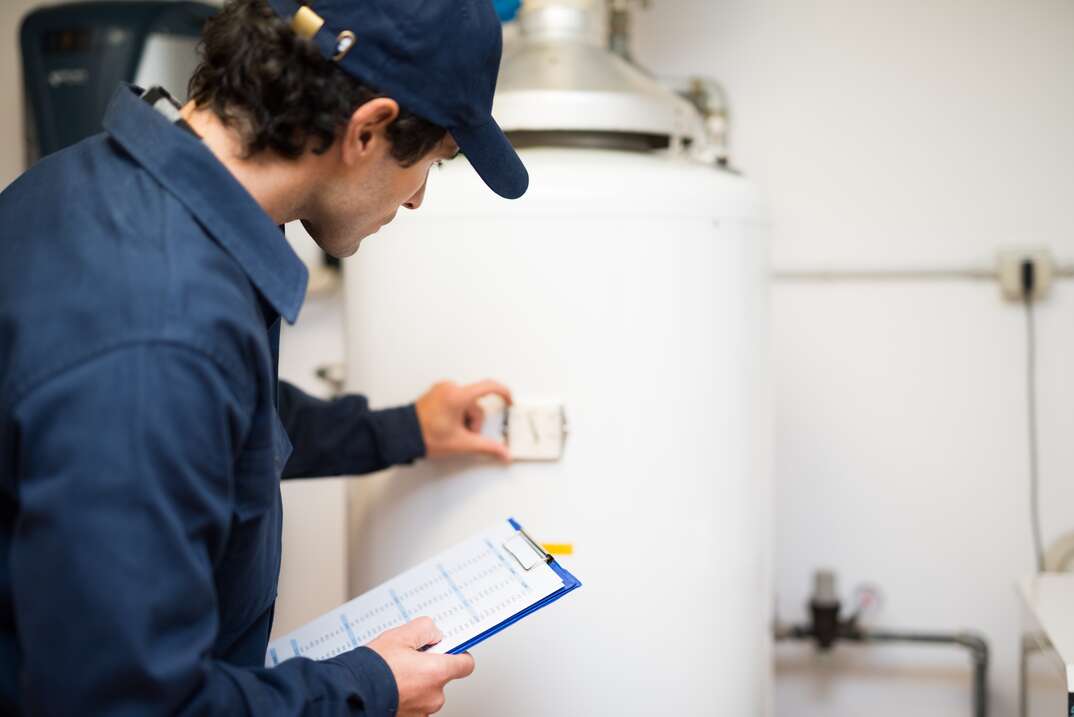What Are the Different Types of Boilers?

Boilers are one of the most common home heating options — especially in the Northeast and in older houses — and the right unit can keep your home comfortably warm when the temperature outside drops.
Read More Heating and Cooling Articles
If you're in the market for a new residential heating system, you'll want to make an informed purchasing decision.
What Types of Boilers Are Available?
A boiler is a type of central heating system that heats by circulating hot water or steam through pipes and into radiators throughout a structure. These systems may be powered by electricity, propane, natural gas or heating oil, depending on the type of unit and the fuel availability in a region. Several types of boilers are commercially available currently, and each type differs in the way it heats your home, its energy efficiency and in the type of fuel it uses.
Steam Boilers
Steam boilers work by turning water into steam, which flows through tubes or pipes to a home’s radiators, warming the house. The water then condenses and returns to the unit to be reheated.
You can often find steam heating systems in older homes. These units are durable and reliable, often lasting between 15 and 30 years, and they're typically fueled by oil, propane or natural gas, depending on the fuel availability and the homeowner's preference. However, steam boilers are often less efficient than hot water boilers, and they’re noisy. Plus, because they typically use bulky, upright radiators, they may limit possibilities for a home's furniture placement. These units also operate using a single thermostat, so heating may be inconsistent from room to room.
Maintenance is another consideration with steam boilers, as they require significant upkeep. This may include a weekly check of water levels and a sediment flush. To ensure safety, they should be inspected annually by a professional HVAC technician.
Hot Water Boilers
Hot water boilers, which heat a home using hot water rather than steam, are more common in modern houses. These units work by pushing hot water through pipes to baseboard radiators or a radiant floor heating system, which can transform your flooring into a large radiator.
Because hot water boilers let you control the temperature in various areas of a home using multiple valves and thermostats, they can be more energy efficient than steam boilers. However, these systems are prone to air bubbles, which can hinder circulation, preventing the boiler from heating the structure effectively. Consequently, they may require frequent bleeding to rid pipes of unwanted air.
More Related Articles:
- Hiring an HVAC Tech? Here are 5 Top Tips
- What's in My HVAC Technician's Van?
- HVAC Out? 5 Common Causes and Quick Fixes for Each
- How Much Does an HVAC Filter Cost?
- HVAC Upkeep Costs: Everything You Need to Know
Condensing Boilers
Condensing boilers are a specific type of hot water boiler and conserve energy using a secondary heat exchanger to collect heat from exhaust gases before they escape out the flue. This collected heat is used to preheat water entering the system, a process that makes these units substantially more energy efficient than traditional hot water or steam boilers.
Condensing boilers also cool the flue gases, so they can be installed with lighter exhaust piping, such as PVC, which typically costs less than the galvanized steel pipes often used to accommodate the high water temperatures required for traditional boilers. Additionally, because they operate efficiently using lower water temperatures, they’re ideal for radiant floor heating systems. In some areas, homeowners who purchase condensing boilers may also be eligible for energy rebates.
Combination Boilers
Combination boilers get their name from their dual purpose. They can heat your home and provide hot water for showers, dishwashers and other household uses, eliminating the need for a separate hot water heater. Often referred to as combi boilers, these units contain a secondary heat exchanger that heats the pipes carrying clean water to your taps and appliances. They may be fueled by oil, electricity, propane or natural gas.
Combination boilers don’t store water in tanks, so they’re compact, which makes them ideal for small houses or tight spaces. These high-efficiency units also heat water quickly, so you can warm up your home or get hot water for a shower almost immediately. Plus, they’re cost-effective and environmentally friendly.
On the downside, because combi boiler heating systems typically can’t accommodate households with high water demands, they aren’t suited to large families or homes with multiple bathrooms. Additionally, combination boilers are complex systems, which may make repairs complicated, time-consuming and costly.
Not every type of boiler is appropriate for every residence. Before buying a home boiler system, be sure to consider important factors, such as the climate, your home’s size and the fuel availability in your area. A professional HVAC technician can help you select a unit that's suitable for your household's heating and hot water needs.
Elocal Editorial Content is for educational and entertainment purposes only. Editorial Content should not be used as a substitute for advice from a licensed professional in your state reviewing your issue. Systems, equipment, issues and circumstances vary. Follow the manufacturer's safety precautions. The opinions, beliefs and viewpoints expressed by the eLocal Editorial Team and other third-party content providers do not necessarily reflect the opinions, beliefs and viewpoints of eLocal or its affiliate companies. Use of the Blog is subject to the
Website Terms and Conditions.The eLocal Editorial Team operates independently of eLocal USA's marketing and sales decisions.



